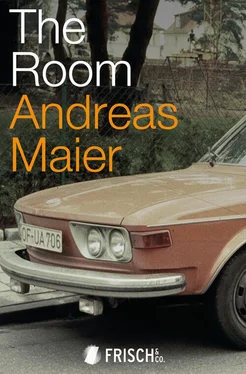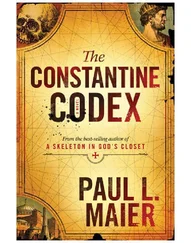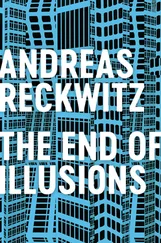But we’re not at that point of the story yet. J is still in Frankfurt, at the post depot, somewhere between his twelfth and fifteenth beer. There can be no doubt that he would have carried out his work properly. J always hated whatever he was ordered to do, but his respect for his employers was almost as great as the respect he had for his mother. He never escaped it. He was always filled with respect. He had this ability to impose a kind of Wehrmacht system onto everything. Or maybe it was a hunting system. But you could just as easily look at it the other way around, that perhaps he was looking for something resembling his mother in the things around him, something just as great and unbreachable, and perhaps he found it in the Wehrmacht (as well as in the mountain and its rescue operations, movie mothers and dirndl-clad women), or in Rommel, or the tank in Russia he may have dreamed of in much the same way as someone might dream of a Porsche Cabriolet nowadays. In the end — is it acceptable to say that? — my uncle’s concept of happiness, which was still tied up with the collective after all, with people and the people, to the very last moment and in mortal peril , was the opposite of hedonism, it was a desire for sacrifice, the kind that children have and which otherwise is perhaps only found in the BDSM scene, where everyone has their longings, to put it mildly, and if my uncle had ended up amongst them, then who knows what might have happened; by the end they might have had him by the scruff of his neck and taken full control of his bank account. After all, people only ever wanted one thing from him: his money.
Maybe he was enjoying the summer light that would stream through the glass of the Hauptbahnhof in July, in August and at midday in September, or at least I hope he was, drinking his umpteenth beer, no longer keeping track and without any chance of being rescued from everything, but maybe without any sense of despair, as he wouldn’t have felt it in any case, just as he didn’t feel pain. Nor is it improbable that they were already on a break and heading into the red light district around the station, dreaming away amongst everything on display in God’s paradise, the thing they had been created for, here in Frankfurt am Main, regardless of where they were from. There are two possibilities; either they were all sitting on a bench together, beers in hand, cigarettes clasped between their fingers, engaged in respectable conversations and dialogues of decorum and conformity, even or perhaps specifically amongst and with the foreign workers, who had their pride too, even at the post depot, even though they probably had never wanted to be there, just as they presumably had never wanted to go to Germany, but that was how it had all turned out nonetheless. The Spaniards and Italians talked about their families and so did my uncle, although he predominantly talked about the great family business and the great father, the company boss (thirty employees! except J wasn’t one of them). Or, the other possibility was that they already had plans, had already taken the next step, fully acknowledging their insatiable lust for life, which seemed to be re-born each and every day, and that they had only one thought on their minds: to head straight for the Kaiserstrasse and get rid of it in whatever way possible, no matter whether it was in front of the screen or with something in the hand. You can picture them like that, too: the bell rings to announce their break and they’re off at once, hands already hovering by their trouser buttons. And so they were always close to happiness when they were in Frankfurt, and only recovered once they were back home with their families and children, the ones they were doing all of this for, the ones they were earning money for every day in the package distribution department of the postal depot at the Frankfurt Hauptbahnhof.
My uncle wasn’t allowed to drive a fork-lift truck at the depot, despite the fact that he had a driving license. The fork-lift driver was a natural authority, and J didn’t have this natural authority; after all, when it came to his awe for the mountain rescue team, he couldn’t even cope with us, my brother and me. J stood there in awe in front of the fork-lift while it was stationary, he stood there in awe while it was in use, while someone else was allowed to use it, staring at all the maneuvers and steering and lifting techniques in detail, as if he could learn something by such detailed study, but he never learned anything, his studying of things was just as pointless as the unscrewing of the circuits and dynamos in the cellar: once he stopped, everything would just lie around in incomprehensible parts, never to be put back together again. His longing to get closer to things just dismantled everything instead. Whatever he held in his hands fell apart. If J had ever been alone with the forklift truck in the package hall and there hadn’t been a soul around within a one kilometre radius, I don’t believe he would even have sat down on it, even just to try it. If he had, he would have been incapable of starting it, let alone driving it or operating the forklift; but it wouldn’t have come to that anyway, for at most he would have walked around it with the utmost of awe, placing his hand on the bodywork, gazing with interest at the buttons and handles, and then he would have just waited until somebody came. He was always waiting. His life consisted of waiting. If no one was around it was like he was switched off, except in the cellar, except in the forest, except in the inn (although there was always someone there) and except in paradise (there was someone there, too, or at least in theory).
He always told his mother when he was heading out, every single day. She always knew when he went out, when he arrived back, how long he was out. She didn’t even have to ask him to check in and out with her, for the two of them still had the exact same relationship as they had before he went to the Rhineland, back when he was supposed to seek the protection of his younger siblings and yet, most of the time, just dawdled around instead. This unconditional, compulsory attachment to his mother raged in his soul like something metaphysical, and it was utterly unbreachable: I always found it touching that, as a person, he wasn’t completely locked inside himself, but instead fully opened up to another. For the duration of his whole life, that made him so innocent. A human being without any concept of sin. (Even if, like I said, he could sometimes look as guilty as a dog caught in the act.) He was, after all, never at fault. It was as if the forceps had immediately taken the forbidden fruit from his mouth — You won’t have it, not you! as God’s first words when he was born. J had the same relationship with everything and everyone: he went down without a fight. With his mother, perhaps at the train station kiosk in the mornings, perhaps at the postal depot in Frankfurt with his workmates, either by acting in a completely proper manner with them, which is possible, or by being utterly lewd, which is equally possible.
People still smoked back then. It was the golden era of the filter cigarette in Germany. They probably smoked like chimneys at the post depot. They had cigarettes in their mouths when they were lugging packages around, cigarettes in their mouths when they were filling in forms, cigarettes in their mouths when they were on a break. All of them had yellow fingers. I remember my uncle’s yellow fingers very clearly; they were the first yellow fingers I ever saw in my life. That came along with the silage-like stench: the stench of cigarettes. The filter cigarette was a medium of communication — that was what had made it so successful. Because people by themselves weren’t enough; there had to be something else, and that something was the filter cigarette. It broke the ice. It was a dry schnapps. At the height of his smoking, my uncle went through three packets a day, like many people did back then. It was the filter that made mass cigarette smoking possible. It made everything so simple. Part of the image of day-to-day life in Germany was the country engulfed in a cloud of smoke. To this day, I still believe that every one of these filter cigarettes prevented someone somewhere from becoming depressed. Hence the swaying sensation that kicks in with the first drag. There’s always something there with you, it rescues you. My uncle, rescued. He was never alone at the post depot in Frankfurt; he always had his cigarettes and could light one up at any time. And how he coughed! A long, raw cough that became wet at the end, almost slimy. You could hear the phlegm churning around in his throat, and his eyes would stick out in this strange way, as if they wanted to burst out of him. As if, just once, they wanted to take a look at him, the uncle, from the outside, instead of always looking out of him from the inside. He smoked far too much, everyone knew that, but he was still comparatively young and didn’t have any pains; he didn’t know what pain was, remember. For him, pain was a foreign word. He had a blind spot where pain was concerned, one might say, he couldn’t see it in the slightest. In later years, my uncle almost lost his legs, never even having felt the complete blockage in his blood vessels. It was diagnosed by chance, entirely by accident. Just like he was once diagnosed with a ruptured appendix by chance, after he fell down the stairs and was taken off to the doctor. Neither of those afflictions, the fall nor the rupture, caused him any pain. Hotplates didn’t hurt him either; it was only the smell of burning that made him realise what he had just done for the umpteenth time. Even the beatings at school didn’t cause him any actual pain, only injuries. He bled, he was peppered with blue flecks, and they loved kicking him in the side when he was down on the ground, but none of it caused any pain. It didn’t even make him sad. The only thing that made him sad was that it made the others sad — his siblings, his mother — when he bled or burnt himself. For his family had already realised that there was much more at stake here than merely protecting him from getting beaten. It was a question of survival.
Читать дальше











